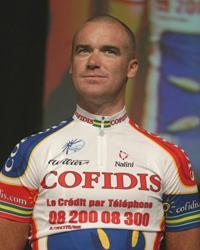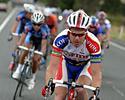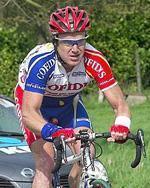
Recently on Cyclingnews.com |
An interview with Stuart O'Grady, March 24, 2005
What lies ahead
By Anthony Tan

|
With a number of cycling's monuments just a few weeks away, talk has turned towards races like the Ronde Van Vlaanderen, Paris-Roubaix and Amstel Gold, and riders like Backstedt, Boogerd, Boonen, Dekker, Hincapie, Van Petegem and Wesemann. The name Stuart O'Grady is also in amongst the chatter, and after his performance last weekend, deservedly so.
True, there was little (actually, nothing) anyone could do against the might and power of Alessandro Petacchi and Fassa Bortolo at Milan-San Remo.
But Stuart O'Grady did better than most. After being isolated following a pile-up on the Cipressa and getting hooked into the barriers with less than a kilometre remaining, the freckly-faced Aussie put in a massive effort to move forward 20-plus places in the last few hundred metres, eventually - and quite remarkably - finishing fourth.
Was he satisfied?
"Yeah... I was happy in a way, I guess," reflects O'Grady to Cyclingnews a few days after La Primavera, now back home in France. "I went there hoping for a better result and to pull off a win, and I really felt like I had the legs to do better, so I was probably a bit disappointed at the finish. But the sprint was pretty chaotic, and in the end, I'm pretty happy with a fourth place in a World Cup."
For the 31 year-old South Australian, prime time is now, with more of spring's biggest and best one-day events just around the corner. "I'm ready to go for Tour of Flanders, Paris-Roubaix and Amstel Gold; I'm feeling pretty good about myself, and now I'm going to try and get a result," he says with the muted confidence of a cagey, seasoned professional that he is.
Though careful with his choice of words, in his voice there's a certain optimism, excitement and tension - all at the same time - for what lies ahead are truly some of greatest races a cyclist can ride in, a journalist can report on, or a spectator can watch.
"I'm just going to take each Classic as it comes and try and win one - I'm not too focused on the overall ProTour as such."- O'Grady when asked about his ambitions in the ProTour |
Cyclingnews: What were your expectations going into the Milan-San Remo? Everyone was talking about Freire, Petacchi and Zabel, but you were billed an more of an outside bet - did you prefer it that way?
Stuart O'Grady: Yeah, Petacchi and Freire were fresher, and Petacchi proved on the day that he was a level above everyone; he had an absolutely incredible team and was extremely hard to beat. I knew personally that my form was good, and after Milan-San Remo last year, I knew that I was up there with a chance, but it was going to be very difficult to beat Petacchi.
CN: Despite your excellent fourth place finish, it appears your form and preparation at Tirreno-Adriatico was more low-key than, say, last year, where you finished fifth overall. Have you made a conscious effort to be at your best right in the middle of the Spring Classics?
SO'G: Well, I have pretty much the same objectives as last year, and I think my form was going OK at Tirreno, though I got a little sick during the race. But Milan-San Remo has given me a bit of confidence and showed me that the form was there, and I'm ready to go for Tour of Flanders, Paris-Roubaix and Amstel Gold; I'm feeling pretty good about myself, and now I'm going to try and get a result.

|
CN: Let's talk about the closing kilometres of M-SR. Brad McGee said the crash on the descent of the Cipressa changed the face of the race; would you agree, and where were you at the time?
SO'G: Yeah, Milan-San Remo, you really only lose that race in the build-up to the Cipressa and the Poggio. I made sure I was in the first 10 [riders] in the last five k in the build to the Cipressa; I heard the crash, but obviously didn't see it or wasn't involved in it, though it made things more chaotic, that's for sure.
CN: You lost a valuable team-mate in Matt White as a result of the crash on the Cipressa. Did that concern you - was he working for you that day?
SO'G: I had 100 percent team support that day. Unfortunately, Whitey got caught behind the crash, and not having team-mates there at the finish ended up making a very big difference. If you at what Fassa Bortolo had with three or four riders at the top of the Poggio... when you're there on your own, it makes a big difference.
CN: Were you concerned about Bettini's move before the Poggio? How much effort did you have to put in to stay with the front group?
SO'G: I felt really good up over the Cipressa; I was in about 30th position at the bottom - which I was happy with, because obviously [Bettini] was driving it - then on the Poggio, he started to struggle. I guess the main part of the race after [the Cipressa] is to be in the first few at the foot of the Poggio, and I was in about fifth wheel, so I was perfectly placed.
There were a few attacks, and I went in one myself, but I realised it was going to be too hard out there and the pace was too fast at the front. So I just tried to take a few deep breaths, recover and get ready for the sprint.
CN: How well were you positioned coming into the final few corners, which are pretty much crucial?
SO'G: Yeah, I went OK until about the first left-hand turn with about a k to go, and then coming out of the bottom right-hand corner, I got a pretty good hook into the gutter, and got swamped. I remember looking up at 400 metres to go and I was in about 25th position, thinking, 'I've completely stuffed my race - I'm just going to have to go for it'. I started my sprint with about 300 metres to go and it all panned out across the road... I kind of weaved my way through and got myself up into a reasonable position in the end.
CN: Petacchi won by some margin from the rest. It's his first big one-day win; did it surprise you to see him so strong in the finale?
SO'G: Yeah I was. I mean, he's been going really well and everyone's been talking him up, how his climbing has improved a heap, and I think it has. He wasn't isolated, but I don't think he any riders left with about 300 metres to go, so for him to win that sprint just proves the power that he's got and how good a bike rider he is.
CN: Hondo and Hushovd also finished ahead of you, but the top three riders at this year's race all have different physical attributes to you, in that you can climb well when you need to. There's been talk about the possibility of the course changing next year to include a 5 km-long climb in the finale, as well as the Cipressa and Poggio - do you think this will change anything, or will the race still be in the favour of the sprinters?
SO'G: I think they should leave the race how it is. There's a lot of history behind it, it's a hard race... if they stuck another hill in it, I don't think it's going to change the race that much. The guys up the front have got big power, and another five k climb I don't think will really change the face of the race - if they stuck a 10k climb, then maybe it would. But I think Milan-San Remo is Milan-San Remo; it's a hard race as it is.

|
CN: You mentioned you'll be riding quite of few of the Classics - I gather Flanders and Roubaix are right at the top of your hit-list?
SO'G: I'm really geed for Flanders; Roubaix's probably going to be a little bit difficult for me; if I'm on a good day, then maybe I get in the top 10. Then Amstel I'm not sure... I think if I go really deep in Flanders and Roubaix, by the time I get to Amstel, I'm going to be pretty stuffed, but I'll evaluate the situation then.
CN: After your World Cup win in Hamburg last year, you must now believe in yourself that a win at one of these races is possible?
SO'G: Yeah, now that the Classics are here, these races are my speciality, and no question about it, I'm up for at least a top four or five in one of these. That is my objective in the team and y'know, that's what I'm paid to do... and the experience with race tactics in these big events, I'm getting more and more confident as we go.
CN: You've done two of the three ProTour races so far this year. Have you noticed any change in the racing, be it subtle or significant?
SO'G: Not at the moment. I haven't seen a real change, but there's a lot more pressure on the top teams, because to try and get points is so rare - I think that's made a big difference. In Tirreno, if you spend the whole day off the front, and get second, you don't even get a point. There's a lot of questioning going on in the peloton; if you can get these points, they're very valuable and it's all good, but if you're an average bike rider, it's going to be very tough to earn points in the season.
CN: You're currently placed 10th on the individual ProTour rankings. With a solid performance in April, you could well take the lead in the ProTour - is this something that's crossed your mind, or excites you and the team, or is the whole ProTour jersey thing still too new to be worth chasing?
SO'G: Oh, it'd be nice to have, but I definitely think they could do with a revamp of the jersey (laughs) - I can understand why Oscar Freire wanted to ride around in his rainbow jersey! I'm just going to take each Classic as it comes and try and win one - I'm not too focused on the overall ProTour as such; the major objective is to focus on [the races that were once part of] the World Cup and the ProTour points that come with it.
CN: Finally, with the events that happened at Cofidis last year, it's obvious your preparation for the Tour would be different as a result of circumstance. How will you go about things this time round?
SO'G: Not sure yet - we're still looking into my program in the lead-up to the Tour. Quite a big change could happen, but we're still studying the program from after the Classics to the Tour. I'm definitely doing the Dauphine, but what I do before the Dauphine is still up in the air.
